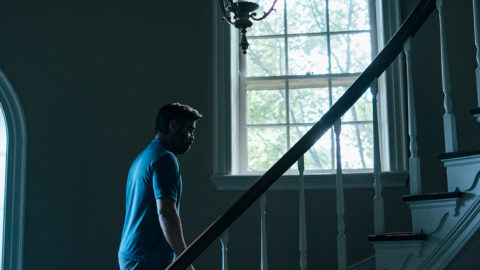By Molly Haskell in the November-December 2018 Issue
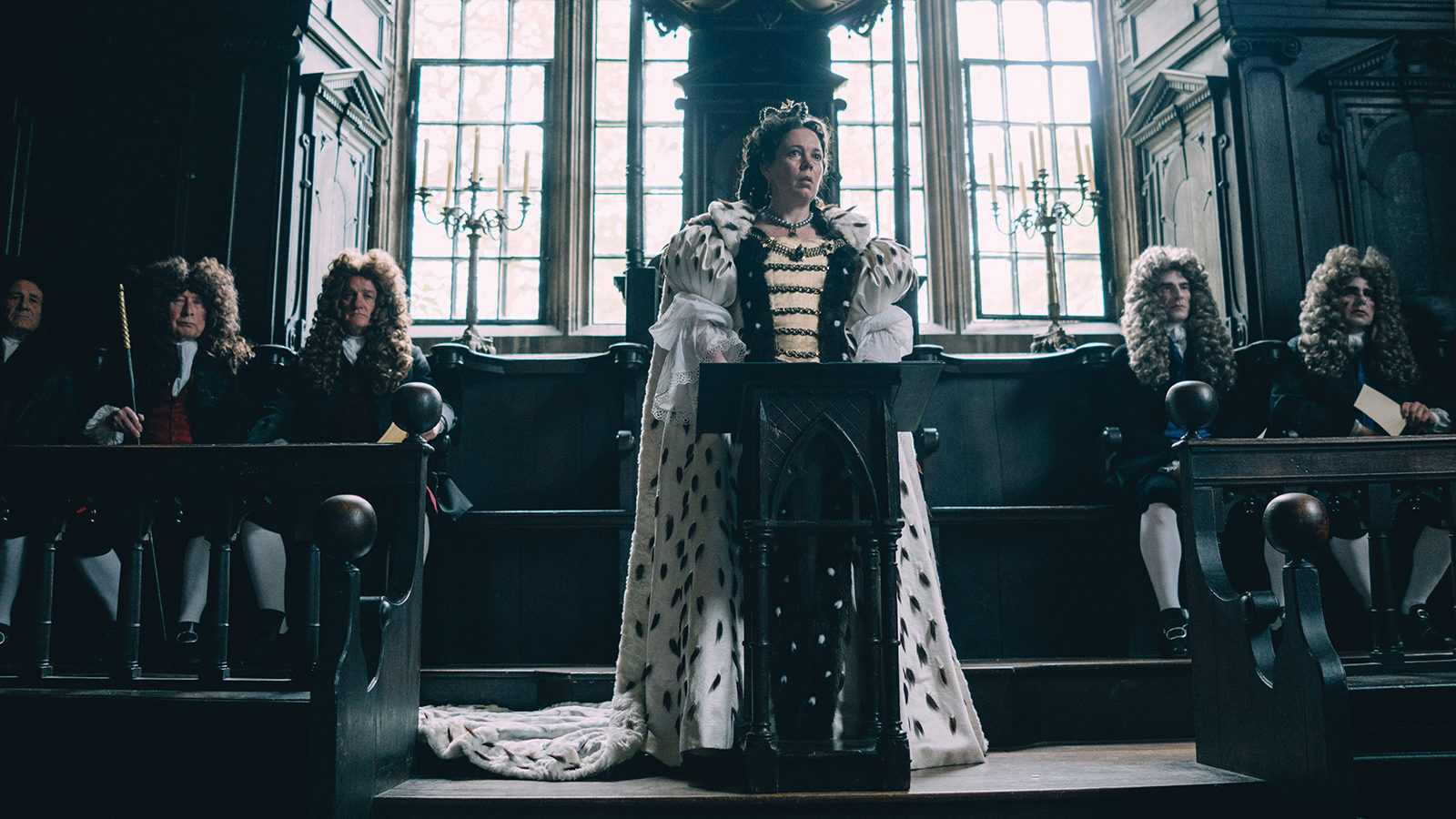
Review: The Favourite
(Yorgos Lanthimos, Ireland/UK/USA, Fox Searchlight, Opening November 23)
In All About Eve, one of the acknowledged models for The Favourite, Bette Davis utters the famous line: “Fasten your seatbelts, it’s going to be a bumpy night,” a quip that might serve as epigraph and trigger warning for Yorgos Lanthimos’s film about a triangular female power struggle in Queen Anne’s court. And not just as a metaphor. First, as we accompany the orphaned Abigail (Emma Stone), distant relative of the queen who is seeking her place in the royal household, we’re squeezed into a rickety carriage, jostled along a rutted mud-splattered road, and finally dropped into the posterior region of the palace—the stables where you can practically smell the manure, and the scullery into whose dismal precincts Abigail will be cast.
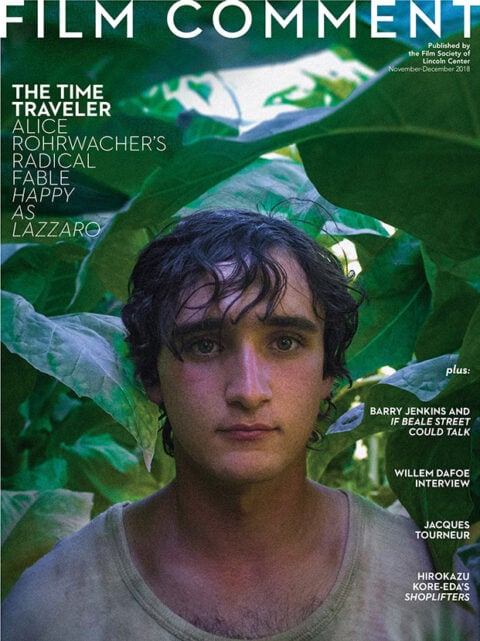
From the November-December 2018 Issue
Also in this issue
If all that were not destabilizing enough, Lanthimos uses off-kilter camera angles and fish-eye lenses to further increase our sense of disorientation and unease. The court of early 18th-century England, in Lanthimos’s unsparingly absurdist view, is a place where nothing and no one is safe, where backstabbing and bad faith are the currency of the day. The Anne created by Lanthimos (and his screenwriters Deborah Davis and Tony McNamara) and played by a magnificently wretched Olivia Colman, is on a mental and physical rack of pain, alternately revved up and assuaged by her cunning lady-in-waiting, Rachel Weisz’s Lady Sarah Marlborough.
This is no inviting tour of corridors bedecked with sumptuous furnishings, but a mocking, pitiless scrutiny of people living in a gilded fishbowl, a court awash in internecine power struggles, conspiracy theories, and real conspiracies. I happened to see the film the day after the Kavanaugh-Ford hearings, and it is a tribute to Lanthimos to say that his portrait of sexual politics on a grand stage was almost as riveting as the political theater—alternately inspiring and mortifying, and finally demoralizing—on CNN.
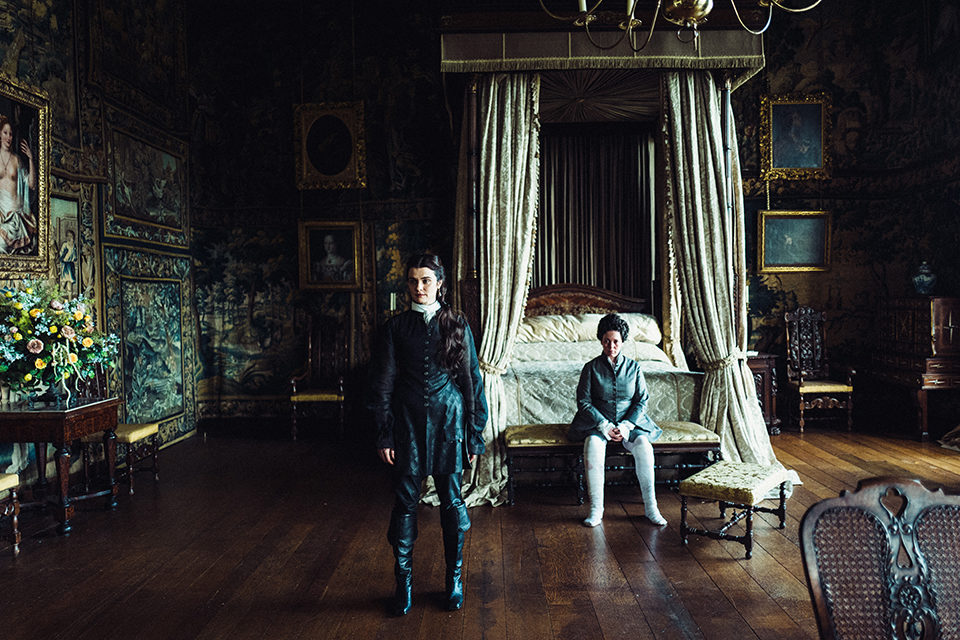
Photo: Yorgos Lanthimos/Fox Searchlight
As you might expect from the director of such provocations as Dogtooth, The Lobster, and The Killing of a Sacred Deer, the world created is a kind of No Exit, with its own rules and rituals, most of them either disgusting or deadly. It assumes its place alongside such jaundiced takes on the patrician past as the coolly detached Kubrick of Barry Lyndon, or the gleefully bloodthirsty Peter Greenaway of The Cook, The Thief, His Wife & Her Lover, or the same director’s archly biting The Draughtsman’s Contract.
The charm in doing period is finding the right balance between a baseline fidelity to the past, its dress and rituals and habits of mind, and a modernizing touch that brings it into an immediate and startling kinship with our own time. This Lanthimos does brilliantly, with bawdy expletives and kinky sex scenes that could be right out of the TV series Billions—another drama of shifting loyalties among ethically challenged kings of the universe—and rate comparison to the equally raucous anachronisms of The Death of Stalin. In all of his films (heretofore devised with his longtime scenarist and fellow Greek Efthymis Filippou), he’s found a pitch of stylization all his own. The exuberant embrace of excess, vituperation, and venom here reminds one of Restoration Comedy, which Anne’s predecessor, her uncle Charles II, made possible by reopening the theaters that had been closed down by the Puritans. In reacting to the years of repression, dramatists embraced immorality along with explicit sexual language, mocked propriety and impropriety alike. Such juxtapositions of incongruities seem perfectly suited to Lanthimos, whose dialogue veers disquietingly between the stilted and the overfamiliar.
Abigail, as a minion of the court, is dwarfed by giant tapestries, and then cast adrift upon an endless horizon, as she begins her ascent. The scullery maid, through discovery of an herbal concoction that soothes the queen’s blisters, rises to an upstairs post. There, she’s brought immediately into conflict with Lady Rachel, by far the more seasoned and hard-boiled of the two… and a sharpshooter as well. The Favourite is operating on two levels, the political and the personal. Ideologically, Rachel is manipulating the queen into furthering the war with France, in opposition to members of Parliament who desire peace. Privately, she keeps the queen in her grip with sado-sexual shenanigans, finding that the ruler’s pathological mix of self-pity, suspicion, and genuine pain requires a steady dose of abuse (“Yes, you do look like a badger”). She scorns the queen’s adored bunnies—17 that are her substitute children (she lost 17 human ones through miscarriage or death soon after they were born). Though she does learn to shoot a rifle, Abigail takes the opposite tack: she befriends the bunnies and soothes the queen, employing the caress instead of the whip, finding her way to an intimacy and securing an aristocratic marriage to boot.
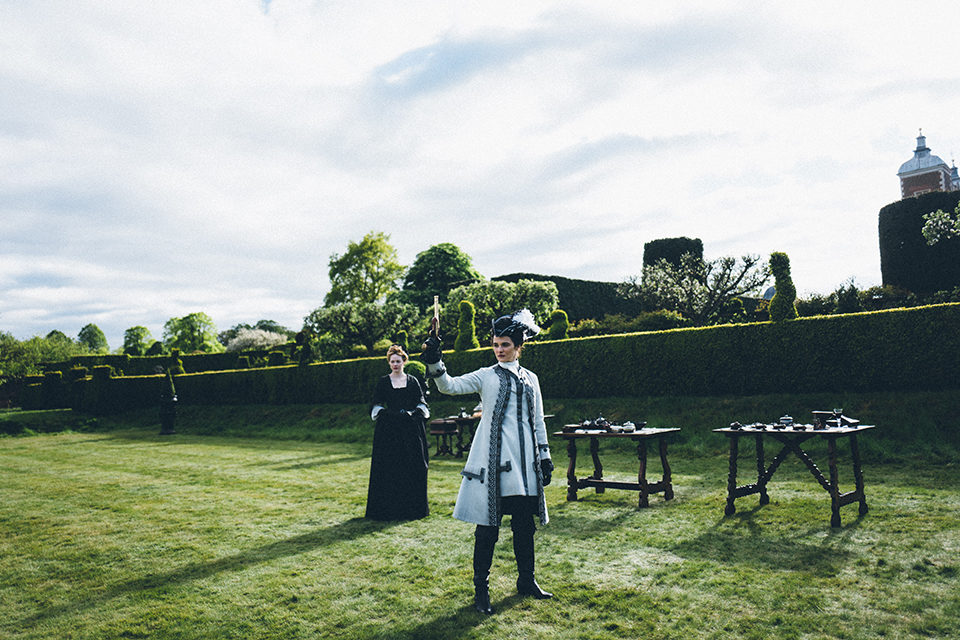
Photo: Yorgos Lanthimos/Fox Searchlight
Stone and Weisz make wonderful antagonists, Weisz so severe she is almost un-beautiful, Stone the seeming innocent whose glittering eyes see more than they let on. The soul shrivels. Corruption comes inevitably as it must in a place where one is obliged to think strategically every minute of the day or die. If there is an emotion at the end it is a subdued melancholy that this must be so, that this Scheherazade must caress the right spots on the Queen’s festering body or be damned into oblivion. We are put in the curious position of members of the court: we don’t know whom to root for, neither choice very appetizing, but will one of them prove human? Or should we just stick with the winner?
What is the payoff for such cynicism? My main reservation about Lanthimos is why? What is he up to? The film runs out of steam in its last quarter, a defect I find in all of his films, and I think it’s because his purpose is unclear. What is he satirizing in our present day? The films of his that do work for me connect on a contemporary human level, explore a recognizable social symptom or malaise: the fanatic home-schoolers in the ingenious Dogtooth, the arrogant surgeon in The Killing of a Sacred Deer with his ironclad alibi (“If something goes wrong it’s never the surgeon’s fault”). But the dystopian premise of The Lobster—enforced coupledom and straitlaced gender preferences—seems more redolent of the conformist ’50s than of our gender-fluid present, where singles are less anathematized than they have ever been.
The Favourite is somewhere in between: it carries us along on its exuberance and wit, its diabolical conceit, until it seems to gradually deflate; the verbal pyrotechnics disappear, with nothing to replace them. We live in a time of dark narratives (or anti-narratives); fractured plots; elusive, opaque characters; but even without the usual coordinates, we usually sense a director’s purpose, though we can’t always put it into words. I’m not sure where to locate this driving force, this animus, in Lanthimos. It’s a dark view, but dark views, like sunny views, have to come from somewhere. Where is Lanthimos’s dark sun? I don’t know, but I’ll definitely keep watching.
Molly Haskell has written for many publications, including The Village Voice, The New York Times, Ms., Saturday Review, and Vogue. She is the author of Steven Spielberg: A Life in Films and From Reverence to Rape: The Treatment of Women in the Movies.



